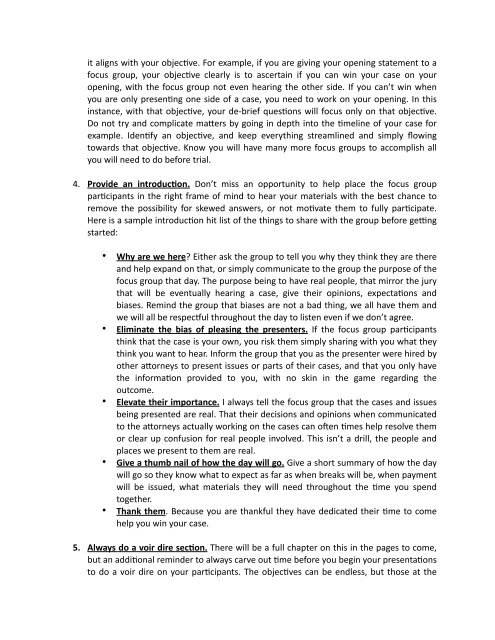FOCUS GROUPS BOOK
Create successful ePaper yourself
Turn your PDF publications into a flip-book with our unique Google optimized e-Paper software.
it aligns with your objecIve. For example, if you are giving your opening statement to a<br />
focus group, your objecIve clearly is to ascertain if you can win your case on your<br />
opening, with the focus group not even hearing the other side. If you can’t win when<br />
you are only presenIng one side of a case, you need to work on your opening. In this<br />
instance, with that objecIve, your de-brief quesIons will focus only on that objecIve.<br />
Do not try and complicate maPers by going in depth into the Imeline of your case for<br />
example. IdenIfy an objecIve, and keep everything streamlined and simply flowing<br />
towards that objecIve. Know you will have many more focus groups to accomplish all<br />
you will need to do before trial.<br />
4. Provide an introduc6on. Don’t miss an opportunity to help place the focus group<br />
parIcipants in the right frame of mind to hear your materials with the best chance to<br />
remove the possibility for skewed answers, or not moIvate them to fully parIcipate.<br />
Here is a sample introducIon hit list of the things to share with the group before geZng<br />
started:<br />
• Why are we here? Either ask the group to tell you why they think they are there<br />
and help expand on that, or simply communicate to the group the purpose of the<br />
focus group that day. The purpose being to have real people, that mirror the jury<br />
that will be eventually hearing a case, give their opinions, expectaIons and<br />
biases. Remind the group that biases are not a bad thing, we all have them and<br />
we will all be respecdul throughout the day to listen even if we don’t agree.<br />
• Eliminate the bias of pleasing the presenters. If the focus group parIcipants<br />
think that the case is your own, you risk them simply sharing with you what they<br />
think you want to hear. Inform the group that you as the presenter were hired by<br />
other aPorneys to present issues or parts of their cases, and that you only have<br />
the informaIon provided to you, with no skin in the game regarding the<br />
outcome.<br />
• Elevate their importance. I always tell the focus group that the cases and issues<br />
being presented are real. That their decisions and opinions when communicated<br />
to the aPorneys actually working on the cases can oNen Imes help resolve them<br />
or clear up confusion for real people involved. This isn’t a drill, the people and<br />
places we present to them are real.<br />
• Give a thumb nail of how the day will go. Give a short summary of how the day<br />
will go so they know what to expect as far as when breaks will be, when payment<br />
will be issued, what materials they will need throughout the Ime you spend<br />
together.<br />
• Thank them. Because you are thankful they have dedicated their Ime to come<br />
help you win your case.<br />
5. Always do a voir dire sec6on. There will be a full chapter on this in the pages to come,<br />
but an addiIonal reminder to always carve out Ime before you begin your presentaIons<br />
to do a voir dire on your parIcipants. The objecIves can be endless, but those at the






